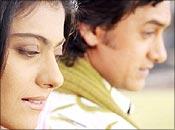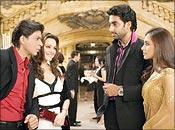Bhatija was speaking at an event hosted by the South Asian American Films and Art Association at the Arts India Gallery in Manhattan, New York, October 7, when she shared these tidbits with an audience of about 25 people. She was in New York after a tour to meet students of South Asian descent at Stanford, the University of California, and the Boston-Cambridge area, as part of research for a story.
The audience comprised at least five writers; Ayan, an assistant director on KANK; young student and aspiring actor Vishal Bhalla and his father; and some Hindi movie fans. Kiran Khaira, director of the South Asian American Films and Art Association's New York chapter, asked Bhatija questions for the first half of the discussion, and then opened the floor to the audience.
After completing her studies in the United States, Bhatija said, she returned to India to do programme development at Sony Entertainment Television. "I was horrible to the writers," she confessed. "You see some things a certain way and you want them to be that way, but you can't make people do that. And it's especially difficult for the writers since they're working on three and four shows at a time. I decided to stop being an ogre and write something myself, and I did my first script."
Bhatija confirmed that the horror stories about how long it takes a screenplay to become a Bollywood film are true.
"I was very fortunate since I've actually known Karan Johar since he was born," she admitted. "He read my first script and passed it on to Aditya Chopra at YashRaj (Films) and so in that sense the introduction was not as grueling as for others, though that's just a foot in the door. I was actually working on other projects at YashRaj and writing for four years before Fanaa was released."
 As she talked about having her writing brought to life on screen, Bhatija revealed: "Fanaa was my story, my characters, I wrote the screenplay and developed it along with the producer, Aditya Chopra, before Kunal (Kohli, the director) even got into it. But it really is a director's medium and that's the bottom line. The first half of Fanaa was somewhat different than what I had envisioned. The director does what he wishes, but at the end of the day if people felt for the characters and their journey, then that job is done."
As she talked about having her writing brought to life on screen, Bhatija revealed: "Fanaa was my story, my characters, I wrote the screenplay and developed it along with the producer, Aditya Chopra, before Kunal (Kohli, the director) even got into it. But it really is a director's medium and that's the bottom line. The first half of Fanaa was somewhat different than what I had envisioned. The director does what he wishes, but at the end of the day if people felt for the characters and their journey, then that job is done."
"These are things you learn the more you work," she continued. "It's difficult to take the first time it happens, because it's your baby and all that, but it is a collaborative medium and I've learned a lot from the experience."
Bhatija said India was never a choice for the location of KANK. "Because the story was not India-based in its origin," she admitted. "Quite honestly, if two people have to have an affair living in a city like Bombay, three days later they'd be found out. You can't be hanging out in cafes, and not have somebody who knows somebody. It really had to be an international location where you can be relatively anonymous."
When asked how new scriptwriters can get a toehold in Bollywood, she admitted it's hard, because there are so many hopes and aspirations of people from all walks of life trying to get into the show business. She mentioned that YashRaj Films' creative director does accept submissions, but she stressed that it's a matter of being persistent, networking and trying to "find someone who has a friend who has a friend who can get you in the door to speak to somebody."
One young woman asked for tips on how to write a script for the first time, to which Bhatija suggested reading a lot of screenplays and comparing them to the films. The scriptwriter added that formal classes are helpful for understanding structure.
Bhatija said she loves observing people and she manages to retain small traits in her memory, "as if by osmosis," that come back to her later. "I do eavesdrop," She also admitted. "I write in cafes a lot. It's entertaining, especially as a lot of young people hang out there and you get great insight to their lives."
A young African-American woman wondered about the increasing appeal of Hindi cinema outside of India, and the subtle trend toward more reality in some Bollywood movies.
 "You want some universality that can reach people all over," Bhatija replied. "But that being said, the way of looking at the world is different from culture to culture. Our films may not do as well as Iranian films, for example, on the festival circuit. But we don't care because our audience, including and excluding the Diaspora, is so large that we don't have to care about catering to the Western mindset and Western way of looking at films. So if Indians in general -- and I'm generalising here -- like to wear a lot of gold jewellery, bright colours, we like to have spicy foods, our sweets are drenched in sugar, we like excess. And if our films have a bit of excess it's because it comes naturally for who we are," she continued. "And we don't need to change that because we have enough audience from who we are."
"You want some universality that can reach people all over," Bhatija replied. "But that being said, the way of looking at the world is different from culture to culture. Our films may not do as well as Iranian films, for example, on the festival circuit. But we don't care because our audience, including and excluding the Diaspora, is so large that we don't have to care about catering to the Western mindset and Western way of looking at films. So if Indians in general -- and I'm generalising here -- like to wear a lot of gold jewellery, bright colours, we like to have spicy foods, our sweets are drenched in sugar, we like excess. And if our films have a bit of excess it's because it comes naturally for who we are," she continued. "And we don't need to change that because we have enough audience from who we are."
Bhatija was circumspect about what she is doing next. "A couple of things are happening, but it's too early to get into now," she said. "I have one script in development and another, I'm in a quest for a story. They're definitely different spaces than Fanaa or Kabhi Alvida..."






 © 2025
© 2025